Features
Amunugama and the Duraiswamy brothers: Rebuttal
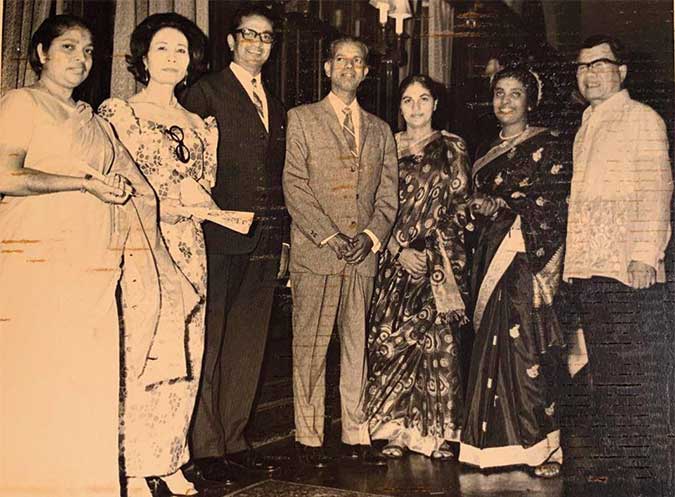
By Ranga Chandrarathne
This is a rejoinder to the extract of Sarath Amunugama’s autobiography published in the Sunday Island on April 9, 2023 under the header “Violence in Jaffna and my departure from Government Service”. If the piece is any indication of the rest of his book, it reflects rather poorly on the written skills of Amunugama . He lacked attention to detail, failed to do a simple fact check and was inaccurate. This does not reflect well on the man as a writer.
I would like to focus on Amunugama’s flippant dismissal of two Tamil administrators i.e., Yogendra Duraiswamy and his elder brother Duraiswamy Rajendra. I had researched and written on some of this earlier.Amunugama derides Yogendra Duraiswamy as “inflexible” and “inefficient”, who he alleges “alienated the Jaffna public with his haughty diplomatic airs.”
Yogendra Duraiswamy in his two years as District Secretary for Jaffna, which then included Kilionchchi, had done commendable work between 1979 and 1981. He introduced bus services in remote parts of the district, increased the frequency of mechanized boat transport services to the outlying islands, developed the integrated rural development plan, supported cottage industries and dairy schemes, launched housing schemes in consultation with Premadasa, helped improve roads, upgraded telecommunications to enable direct dialing to better link Jaffna with the world, facilitated the installation of an Sri Lanka Broadcasting Corporation (SLBC) Transmitting Center to strengthen the radio bandwidth of SLBC in the peninsula, initiated a biogas scheme back in 1979, resumed construction of the Mahadeva Causeway and introduced in 1979 the then innovative concept of the mobile Kachcheri or district secretariat where he took administration to the people. I can give many other examples of pioneering development work as witnessed in the full use of the decentralized budget that had not been fully expended before. I leave it to the reader to decide whether Yogendra was “inefficient”. There is a hubris in the writings of Amunugama.
Now to the charge of Yogendra Duraiswamy being “inflexible”. The ill-fated elections to the Jaffna District Development Councils took place on June 4, 1981, elections that many would agree were rigged. Yogendra as the Returning Officer for the district stood up to President Jayewardene, both with regards to the last minute instructions from Colombo to change the presiding officers at the polling booths and to the formal announcement of the elections results given the widespread booth capture and the stuffing of ballot boxes that had occurred. The Secretary, Ministry of Defense, under Emergency Regulations, and the Elections Commissioner both overruled Yogendra Duraiswamy. He tendered his resignation soon thereafter.
I once again leave it to the reader to decide whether Yogendra who stood up to authority can be characterized as “inflexible”. I would say that he had integrity and was fearless, characteristics I would wish more administrators, including Amunugama had. As to whether Yogendra alienated the Jaffna public, Amunugama fails to provide the evidence. When the Jaffna Public Library was set on fire earlier on May 31, 1981, Yogendra was perhaps one of three or four who were physically present on the scene trying to douse the flames without success. The saber rattling Tamil politicians were nowhere to be seen. Yogendra was fearless in that environment of lawlessness trying to get the municipal bower and then the naval bowser to douse the flames to no avail.
Now to Duraiswamy Rajendra. Once again, Amunugama has failed to do a simple fact check. He is inaccurate and defamatory. Amunugama alleges that Rajendra had argued with an Indian soldier in Jaffna, was summarily shot dead and that no Tamil parliamentarian had attended his funeral. This is false. Let me state the facts.
Duraiswamy Rajendra lived in Jaffna on Clock Tower Road, now known as Mahatma Gandhi Road. The Indian army had instructed residents to move out of the area given hostilities. His wife and he drove to Nallur on Deepavali Day i.e., on October 21, 1987. Rajendra dropped his wife at her parent’s house and a few hours later returned to Jaffna for reasons not quite known.
The Liberation Tigers of Tamil Eelam (LTTE) had opened fire on Indian positions from within the Jaffna General Hospital nearby. The Indian army reportedly withdrew to the Jaffna Fort. They reportedly returned later down the Clock Tower Road on a mopping operation, allegedly killing everyone in sight. Rajendra along with many other civilians had sought refuge in the Jaffna General Hospital. Between 60 to 70 civilians were reportedly killed in the hospital.
The bodies of the dead were then burned on rubber tires by the Indians to avoid an inquest. Rajendra had no funeral. The issue of a “cantankerous” Rajendra getting into an “argument with an Indian jawan”, being shot dead and then having a funeral that was boycotted by Tamil politicians is false. Amunugama should verify before he writes. I also refer the reader to the accounts of Colonel Hariharan of the Indian Army who had covered the same incident, including the death of Rajendra.
Amunugama adds that the Duraiswamy Rajendra was resented by the Tamil professionals in the SLBC, earlier known as Radio Ceylon. He needs to provide the evidence before making blanket allegations. Rajendra had retired as Secretary to the Ministry of Public Administration, Local Government and Home Affairs in the 1970s under Felix Dias Bandaranaike. He was later made a Director at the SLBC. The late Mrs. Ponmani Kulasingham who was in charge of the Tamil division was a loyal and trusted employee who had the highest respect for Rajendra’s methodic overview, his tact and diplomacy. Mr. Mathialagan, also in the Tamil service, had similar high regard for Rajendra. While I am not privy to the dynamics within the SLBC, it is entirely possible that Rajendra, a stickler for what is proper and had refused to kowtow to the diktats of Amunugama. Rajendra stood up to Amunugama and this led to friction.
Now to the Sri Lanka Administrative Service officer Lionel Fernando that Amunugama praises. The Thinapathi newspaper announced in 1979 that President Jayewardene was to appoint Yogendra Duraiswamy, a retired diplomat, as District Secretary for Jaffna and Kilinochchi. Jayewardene had perhaps intended to explore a developmentalist alternative to the politics of separatism in 1979. Amirthalingam and Yogeswaran, erstwhile leaders of the TULF, instinctively viewed Yogendra as a threat.
They immediately mobilized the party machinery to vigorously lobby for the continuation of the then GA Lionel Fernando. The participation of TULF cadre at the funeral of Lionel’s mother needs to be viewed in that light. Lionel Fernando, irrespective of his merits, found himself the unasked for recipient of the TULF’s largess that was more directed to prevent Yogendra Duraiswamy from becoming District Secretary. The TULF invective continued to the end of Yogendra’s term as witnessed in the parliamentary Hansard documentation between 1979 and 1981.
Amunugama of course misses the nuance as he makes scurrilous and unsubstantiated allegations.
Ranga Chandrarathne has contributed articles on a wide range of subjects including Business, Economics, Finance, Politics, Literature, Music, Cinema, Theatre, Culture and Religion for both Sri Lankan and International publications and holds a MBA.
Features
Emotions, learning, and democracy: Reviving the spirit of education
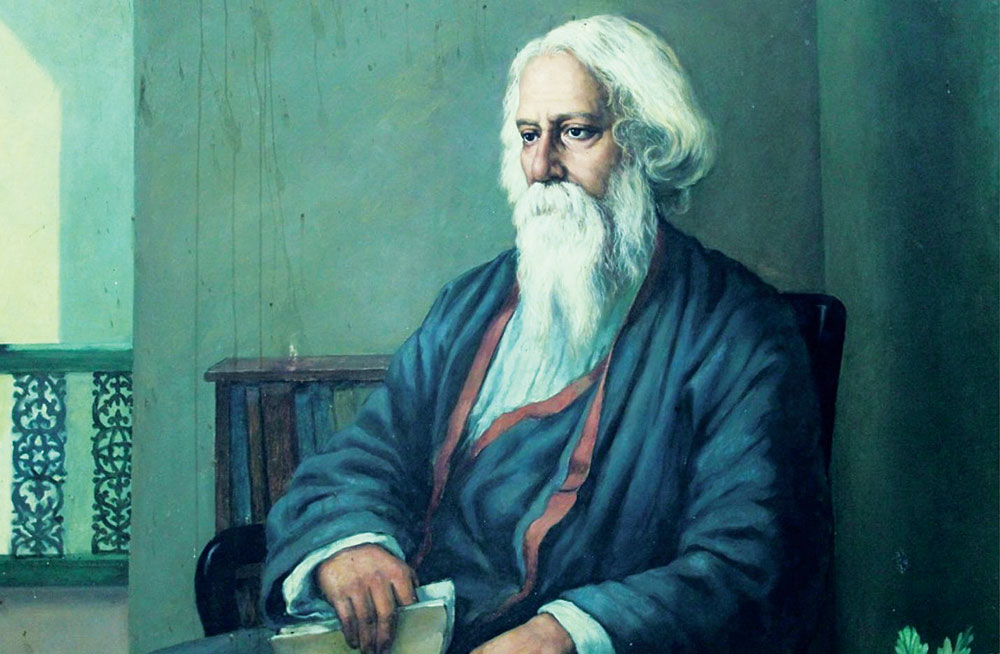
When a father becomes a gambler and his obligation to his family takes the secondary place in his mind, he is no longer a man, but an automaton led by the power of greed.
(Tagore, Nationalism, 2018)
(Excerpts of the keynote address at Annual Sessions at the Faculty of Education, The Open University of Sri Lanka––Empowering Minds: Education for New Era.)
As I am coming from the Humanities and Social Sciences and Performance Studies disciplines, I have a close affinity with education and education philosophy. I have also been engaged in the current debate on higher education, writing and presenting my ideas with the academia and the public domains. I have been motivated by the like-minded scholars (Senanayake, 2021; Amarakeerthi, 2013; Uyangoda, 2017 & 2023; Rambukwella, 2024; Jayasinghe & Fernando 2023; & Jayasinghe 2024) who have been continually discussing problems related to our education and the role of humanities and aesthetics within this sphere. Some of the recurrent themes I have raised in these writings are burning issues in our current education scenario.
Among them, the indoctrination, decline of the arts and aesthetic education in our education sector, and the importance of creative arts in human development were prominent. Hence, in today’s speech, I will continue this discussion and try to broaden the scope of it. The theme of today’s speech can be categorized in three areas of studies: emotions, education, and democracy. What I am going to present today is the role of emotion in education and how this new paradigm of education could lead to the democratic establishments in society. In this speech, I try to build a connection between these key areas of arts and aesthetic education, its vital ingredient of empathy, and how this empathic education supports democracy in the society. This argument will be further elaborated in the course of my talk.
We, as a nation, are on the verge of a transition. This transition has been gradually taking place in our society through the influences of neo liberal economic and political changes happening throughout the region. The glory of our free education system and the heritage we envisioned have also been challenged by the new developments of private educational institutions. These new trends have distorted the true meanings while diminishing the philosophical and moral values of education.
It is the skill acquisition that has come to the fore of the educational discourse. Skills that can be used in the social milieu, and can support the economic growth of the country have been commissioned for our curricula. This mantra has been circulated and supported by the governments which ruled this country for decades. We, as academics, have also adopted strategies to cater these policies to indoctrinate our children to become future entrepreneurs. All the philosophical and moral values of education have been reduced to produce mere labourers. Education is interpreted as a commodity, which is being sold in the market based on supply and demand. We are advised that if we cannot compete in the market, our survival is at stake.
Now, who are we? And, where are we? Where is our society heading? These simple but vital questions are important for us to rethink how we educate our children and what we gain out of it. What kind of society we have created today, as a whole after implementing those educational policies imposed by the authorities? Over the past few years, the world has gone through a myriad obstacles and difficulties facing a worldwide pandemic and devastating wars. After many centuries, we faced the Covid-19 pandemic which challenged us on how we live as a community. Over two years, we were locked down and were isolated from the world. We were locked down in our own houses and the social distancing was imposed reframing ourselves to be connected with each other.
Pandemic, Aragalaya and emotions
Pandemic introduced different ways of learning and teaching in our education sector. The traditional ways of teaching and learning were replaced by the online modes of learning. We started conducting seminars and lectures through online zoom technology and other modes to connect with our students. Students, somehow or other, connected with us through their mobile phones and other devices. The conception behind all these technological advancements implied that the education can be successfully delivered via online mode, and the cost can also be reduced drastically allowing the government to reduce the cost of education and infrastructure.
However, the vital concepts in the educational business, such as corporeality, subjectivity, intersubjectivity, temporality, and spatiality have been redefined and challenged. The learning and teaching were redefined in the virtual reality, reducing the values of interpersonal and corporeal connections between learners. We tend to believe that it is not important for the learner to be present in front of other learners but is enough for her or his virtual avatar to be present.
Soon after the taming of the pandemic situation, our society was shattered with the economic bankruptcy and social upheavals. The financial hardship experienced by the people of the country, resulted in demand for basic needs, cooking gas, petrol, and other important rations. Vigil and silent protests, followed by the mass movements and occupation, ignited the country’s largest non-party people’s struggle, Aragalaya.
Youth of the country encamped the Galle Face Green, and established alternative communal spaces. Cinema, school, community kitchen and even an alternative people’s university were established. Within a few days, many GotaGoGama encampments were established in major cities of the country demanding the President and the Parliament to resign. The new people’s democracy was established by people, for people. This mass movement not only showed us new ways of governing the country but also new ways of living as a community. Human connection and communal living were established until the military actions uprooted the GotaGoGama encampment.
You must be wondering why I am trying to recall this unpleasant past of our social memory. Why is it important for us to go back and see how we passed this phase of time and have come to this point today? As my key ideas are related to emotional education, empathy, arts, and democracy, it is important for us to revisit such a brutal past and learn lessons from it. The pandemic situation taught us how it is important for us, as human beings, to be connected and live with each other as a society.
The pandemic taught us the importance of revisiting communal life, which has sustained and enriched our lives for centuries. Aragalaya further emphasised the importance of communal struggle and co-living in order for us to establish a democratic society. Democracy cannot be sustained without human engagement. It is not something that the ruling government or an alien authority donates to us. It is something that is generated through human connections and collective will. If we clearly scrutinise those two phenomena we experienced in the recent past, it is evident that in the first phenomenon, the pandemic challenged our emotional engagement with others. In the second phenomenon, Aragalaya, we witnessed how important emotions are to reconnect with people and demand for democracy.
Anxiety of our time
Today, as educators, we are on the verge of resolving complex issues related to education. Information technology and AI have invaded the traditional teaching and leaning approaches. The role of the teacher is being challenged and also being shifted by artificial intelligence. The question arises, whether we have a key role to play in the lecture theatre or in the classroom when AI invades our positions. With technological advancement and artificial intelligence, our role as teachers and also what we teach are being challenged. Now, the question is what educational philosophy or theory is suitable for us to guide our next generation of learners’ what methods are appropriate for this new generation to learn and become valuable citizens for the country.
The argument that I want to bring forward is that in our education, we lost the key ingredient, which is the affective development in learning. In other words, we have not focused on how our learners should be equipped with emotional educational principles. Affective components of our education were marginalised or forgotten in favour of promoting skill development or manual learning. One of the reasons behind this lack is the way we conceptualised our educational policies, defining education in dichotomous ways.
For instance, as philosopher john Dewey says, ‘theory and practice, individual and group, public and private, method and subject matter, mind and behaviour, means and ends, and culture and vocation’ (Palmer et al., 2002, p. 197) are the ways that we defined our educational principles. Dewey’s educational philosophy is based on the key principle that the children should learn in the classroom where they learn the society through ‘miniature community and or embryonic society’ (Palmer et al., 2002, p. 196). It is vital for the students to learn this communal living, because in the larger canvas, they learn to live in the democratic society as elders. Communal empathy is thus a vital component in developing a healthy, democratic and caring society where each person has a place and respect.
Today, we focus on education, but the truth is we are living in a paradoxical era. Bruzzone (2024) argues that with this pandemic situation, the ongoing conflict between developed nations, and also the advancement of television and online technology, our young generation is in a conundrum. Living in these complex social terrains, our young generation is experiencing complex inner upheavals. He argues that,
The rhetoric of happiness and the entertainment industry keep children and adolescents in a state of intermittent distraction that prevents them from exploring their inner self, including its less appealing, grey areas. Cinema, TV, and video games elicit strong emotions, helping the young to evade the desert of boredom and apathy (Bruzzone, 2024, p.2).
Even though our young people are equipped with devices throughout their livelihood, more or less they are isolated. The media always exaggerates that with mobile technology and other online devices, we are connected to the world and are not isolated.
We also tend to think that we are a part of global citizenship. However, the truth is that most of us are becoming isolated though we are connected with others through technology. Hence, Bruzzone argues that in order to overcome such isolation, existential vacuum and indifference, people tend to experience adrenaline rushes through various risk behaviours, speeding, loud music, and psychotropic substances (Bruzzone, 2024).
Affective life
What I argue here is not to give up our engagements with the new technology or devices but to find ways of reawakening our emotional life within us. This affective life is still hidden in our life that our learners do not know how to find it; or rather, we have not taught them to unlock this emotional life within. Our education, as I argued earlier, does not have such intention or components where the learners can be equipped with emotional intelligence.
We have thrown away all the important aspects of such components in our educational system in favour of developing manual learners. These manual learners do not have such empathic life, affection, or emotional intelligence to deal with their own emotional lives, or they do not have knowledge to deal with others in the society. The result is what we have today: the merciless society where people are competing with each other to accumulate material wealth. Citing Galimberti (2007), Bruzzone further argues how this can create a societal issue when the individual cannot cope with his/her emotional life:
This inability to express and share emotions can sometimes explode, taking the form of uncontrolled aggression and impulsive and maladaptive ways of acting out: when this occurs, unacknowledged emotional experiences (of anger, frustration, a sense of inadequacy, fear, and so on) turn into words or acts of hatred and violence—usually towards vulnerable individuals–,flagging a growing dis-connect between acting, reasoning, and feeling: the heart is not in tune with thought nor thought with action (Bruzzone, 2024, p. 2).
Thus, our education has created this person who is struggling to connect with the heart; heart with the thought and thought with action. This dislocation of the heart with thought and action has resulted in developing antipathy towards the society. This antipathy also destabilizes the democratic social value systems. If we really need to re-establish a democratic society, we should first focus on our existing education system.
It is not all about how we integrate new technology and equipment to facilitate our learners but it is about how we allow our learners to first unlock their emotional life, and secondly think how they reconnect with the society. A new educational approach should be tailored to facilitate this vital objective. Hence, let me briefly discuss how creative arts and aesthetics can be useful for developing such individuals who will be empathic as well as critical towards the social changes taking place in this millennium.
At this juncture, it is important to revisit one of the key thinkers and an educational philosopher, Rabindranath Tagore. Tagore is one of the few philosophers who have been thinking and developing an alternative learning approach through his Vishva Bharathi concept. He established Shanti Niketan where this new approach was primarily being tested. Encapsulating his philosophy of learning, he argued,
For us, the highest purpose of this world is not merely living in it, knowing it and making use of it, but realizing ourselves through expansion of sympathy and not dominating it, but comprehending and uniting it with ourselves in perfect union (Bhattacharya, 2014, p. 60).
As this statement clearly indicates, Tagore’s vision of education is developed for cultivating sympathy towards other humans and the environment alike. This education does not persuade the learner to think about his/her environment as something that can be commodified and utilized as material. The environment where the individual is living is also a living entity that is intertwined with human beings. Therefore, the individual should think in a different way to converge with the environment and find a place for co-living. In order to establish such an empathic educational approach, we need a different mode of educating young people. This Tagorean approach to education clearly emphasizes the value of the affective nature of education. It is the emotional life of the individual which is focused and cultivated through various means of teaching and learning.
Emotion and democracy
As of today, we lack this vital emotional component in our education. One of the fallacies behind this situation is that we tend to believe that emotions reside within ourselves, and they are private and personal. This is a misconception that is being sustained through our existing systems of education. However, on the contrary, emotions do not only provide richness to our own personal lives but they are also the primal tool that connects us with the outer world. In other words, we connect with other human beings in the society through our emotional arc. If the individual disconnects the communal engagement, this can result in destructive mannerism.
‘This disintegration of reciprocity, which weakens the social fabric, effectively leaves the individual isolated in a state of loneliness and uncertainty’ (Bruzzone, 2024, p. 13). This isolation and uncertainties of individuals can also have a negative impact on the healthy relationship with communities and, largely, on the democratic institutions. As scholars argue, this can be resulted in sustaining endogamous, xenophobic and violent neo-tribal grouping that have mushroomed in our society. This is what we have seen in the form of various nationalist upheavals in our society for the last few decades.
This tendency, therefore, leads us to further think about the value of emotional education and also its role in communal living. Further, emotions and emotional competency lead us to engage with other subjects, and also emphasizes that it is a bridge that is built between you and me and the world. When this bridge is broken, our connections between myself, you, and the world could be destabilized and shattered.
That is why scholars such as Bruzzone argue that ‘affectivity is also an ethical and political issue’ (Bruzzone, 2024, p. 12). It is ethical in the sense that my engagement or disengagement with the social beings are formed and developed through the emotional desires that I have inherited. Further, it is political, because, when the individual assumes that his/her existence relies on the communal existence, this assumption leads to political action of individuals. Hence, emotional education is vital for the healthy existence of a society. Cusinato, therefore, states that ‘emotional education is at the core of democracy’ (Cusinato Cited by Bruzzone, 2024, p, 13).
Finally, I would like to highlight one of the brilliant minds of our time, Prof Martha C. Nussbaum and her ideas on why arts education is vital for a continuation of democracy, and also how emotional education is important to achieve this (Helsinki Collegium, 2024). Today, as a civilization, we are confronting various and complex issues threatening the continuation of the human race. These key issues are not limited to countries or nations. They are applicable to all human beings currently living in the world.
Environmental crisis, global warming, food security, poverty, and war are some of the recurrent issues we face today. In order to focus on these larger humanitarian crises, how could we equip our students to think in broader ways to tackle these complex issues? Nussbaum provides us some important points to think on how we could design our education system where the individual can be more empathetic and passionately engage with worldly phenomena. According to her, we need citizens who have the capacity to think and see the world as other people see the world; need to develop the capacity for genuine concern of others, near and distant; teach real things about other groups in the society and learn to reject stereotypes; and promote accountability and critical thinking, ‘the skill and courage it requires to raise a dissenting voice’ (Nussbaum, 2016, p. 45-46).
Conclusion
Nussbaum’s recent works largely focus on how human emotions are connected to the establishment of democratic societies in the world. Arts, culture, and humanities play significant role in promoting positive emotions amongst participants. It also promotes wellbeing and happiness which are vital for a healthy society. Today, we have a new government. This government often emphasizes the importance of investing in education, from primary levels to higher education. They have shown the commitment to change the existing stale education systems which need drastic and constructive criticisms to change for a better system. Thus, we, as educators, thoroughly believe that it is time for us to revisit what we have taught and how we have taught our younger generation for decades. It is time for us to rethink new ways of tailoring our education system where we could promote empathy and develop empathetic citizens who care about others and the environment we live in.
Thank you.
References
Bhattacharya, Kumkum. 2014. Rabindranath Tagore: Adventure of Ideas and Innovative Practices in Education. Cham: Springer International Publishing.
Bruzzone, Daniele. 2024. Emotional Life: Phenomenology, Education and Care. Springer Nature.
Harshana Rambukwella. 2024. “The Cultural Life of Democracy: Notes on Popular Sovereignty, Culture and Arts in Sri Lanka’s Aragalaya.” South Asian Review, July, 1–16.https://doi.org/10.1080/02759527.2024.2380179 .
Helsinki Collegium. 2024. “Democracy and Emotions– a Dialogue with Philosopher Martha C. Nussbaum.” YouTube. June 6, 2024. https://www.youtube.com/watch?v=p3xdcfbE3KA.
Jayasinghe, Saroj. 2024. “Arts and Humanities in Medical Education: Current and Future.” Jaffna Medical Journal 36 (1): 3–6. https://doi.org/10.4038/jmj.v36i1.202.
Jayasinghe, Saroj, and Santhushya Fernando. 2023. “Developments in Medical Humanities in Sri Lanka: A Call for Regional and Global Action.” The Asia Pacific Scholar 8 (4): 1–4.https://doi.org/10.29060/taps.2023-8-4/gp2878.
Karunanayake, Panduka. 2021. Ruptures in Sri Lanka’s Education: Genesis, Present Status and Reflections. Nugegoda: Sarasavi Publishers.
Nussbaum, Martha C. 2016. Not for Profit Why Democracy Needs the Humanities. Princeton University Press.
Palmer, Joy, David Cooper, and Liora Bresler, eds. 2002. Fifty Major Thinkers on Education. Routledge.
Uyangoda, Jayadeva, ed. 2023. Democracy and Democratisation in Sri Lanka: Paths, Trends and Imaginations. 1st ed. Vol. 1 and 2. Colombo: Bandaranaike Centre for International Studies.
Short bio of the speaker
Saumya Liyanage (PhD) is an actor both in theatre and film and also working as a professor in Drama and Theatre at the Department of Theatre Ballet and Modern Dance, Faculty of Dance and Drama, University of the Visual and Performing Arts (UVPA), Colombo, Sri Lanka. Professor Liyanage was the former Dean of the Faculty of Graduate Studies, UVPA Colombo and currently holds the position of the Director of the Social Reconciliation Centre, UVPA Colombo.
Acknowledgements
The author wishes to thank Himansi Dehigama for proofreading the final manuscript of this keynote speech.
This keynote is delivered at the annual sessions of the Faculty of Education, Open University of Sri Lanka on the 6th of February 2025.
by Professor Saumya Liyanage
(BA Kelaniya, MCA Flinders, Australia, PhD La Trobe, Australia)
Department of Theatre Ballet and Modern Dance
Faculty of Dance and Drama
University of Visual and Performing Arts, Colombo, Sri Lanka
Features
Achieving an arduous task: Comparing philosophies

Review of Prof. N.A. de S. Amaratunga’s book:
‘A COMPARISON OF BUDDHIST AND WESTERN PHILOSOPHY’
Prof. Asoka Amaratunga is well known to the readers of The Island by his regular contributions on many topics, including Buddhism, but what is less well known is that he has authored several books on Buddhism. He seems to have well used his retirement from the Faculty of Dental Science, University of Peradeniya in 2006, as he has published four books titled; “Controversies related to Buddhism”, “Ancient Buddhist Philosophers”, “Buddhism on the Silk Road” and the latest “A Comparison of Buddhist and Western Philosophy” which is the subject of this review. A fifth titled “Maithreyanatha, Asanga, and Vasubandu – Their Life and Philosophy” is already in print.
No sooner had I started reading this valuable work than I realised what an arduous task it would have been to write, as I found great difficulty in grasping the meaning of the multitude of terms used in philosophy! Fortunately, he has taken the time and the effort to explain these terms making this book an excellent introduction to philosophy for novices, myself included. However, the scope of the work is much more significant in that it illustrates how Buddhist philosophy has heavily influenced late Western philosophy; an inference I have drawn by reading the book, though the author is less emphatic, perhaps leaving the reader to come to own conclusions based on the facts presented, which I consider a great strength of this book. It is a painstakingly crafted book which goes in to detail and, by the very nature of the subject, a difficult read but appropriate repetitions make the job of the reader easier.
Though there are similarities in the thinking of early Greek philosophers like Socrates, Plato, and Aristotle with the teachings of the Buddha, Prof Amaratunga argues against any influence and states:
“If we consider the comparable periods of the life span of these philosophers it is seen that Buddha lived from 624 – 544 BCE which is the accepted dating in Sri Lankan and South Asian tradition. On the other hand, Greek philosopher Socrates’ life span was from 470 – 399 BCE. Socrates was born more than hundred years after the death of Buddha. On the other hand, Thales of Miletus who is considered the father of philosophy lived during 624 – 546 BCE which closely match the Buddha’s life period. However, there would not have been well developed means of communication between East and West in those early times. Greece was positioned between the west and the east as it were and may have acted as a conduit for transmission of culture and knowledge in either direction but for this to happen roadways had to be built connecting these regions which may not have happened during Buddha’s and Socrates’ time. The oldest global trade route is believed to be the Silk Road which came into partial existence in the 300 BCE and was connected to the West in the 200 BCE. Active trade between the two civilisations began in 100 BCE. Cultural exchanges between the West and the East would have happened since 100 BCE”.
Though in this paragraph, commencing the final chapter of the book, Asoka mentions that the Buddha lived from 624 to 544 BCE and that Socrates was born more than hundred years after the death of the Buddha, in the preceding pages he refers to Socrates as a contemporary of the Buddha and that Buddhism started in the 5th century BCE. Perhaps, this happened because the date of birth of the Buddha is a continuing argument, some authorities opining that it is hundred years after the date accepted in our tradition. Though some speculate whether some of the ideas of Socrates were influenced by the teachings of Buddha, as there are similarities, lack of means of communication makes it unlikely. Interestingly, some experts have opined in the past that the Buddha was influenced by Socrates!
I must point out another error; in reference to Christianity he states: “Christianity began as a sect of Judaism and remained so for centuries until it perceived itself as a separate religion in the 4th Century AD. It spread widely and grew to be a world religion in the 21st Century.”
Perhaps, he meant that Christianity spread widely to be the most embraced religion and continues to do so even in the 21st century, despite dwindling numbers.
The book starts with a chapter on the influence of ancient migration on the development of philosophy, followed by several chapters on the development of Western philosophy up to modern times. He then progresses to Indian philosophy including Buddhist philosophy followed by a chapter on Epistemology. Several chapters then follow comparing Buddhist and Western philosophy dealing with the subjects of Reality, Mind and Psychology, Morals, Karma and Rebirth, Causality, God and the origin of the Universe, Evil, Freedom/Salvation, Idealism, Matter, Universe, Truth, Logic and concludes with a chapter drawing parallels between Buddhist and Western philosophies.
He refers repeatedly to similarities of William James’ views to that of Buddha but Dr Upali Abeysiri, retired Consultant Surgeon who has also written many books on Buddhism, comments:
“The Buddha also showed that the psyche is not a permanent entity but consists of a stream of units arising and ceasing. However, Western scientists attribute the first description of the momentary nature of consciousness to William James, the nineteenth century American philosopher who is considered the father of American philosophy.” (Many firsts of the Buddha; The Island, 3March 2025).
It is a shame that Westerners do not give credit to the pioneering efforts of the Buddha but books of this nature continue to highlight the fact that the Buddha’s thinking was far ahead of times and relevant even today; perhaps, for ever!
Asoka has done a great service by bringing out this analytical publication which should appeal to anyone from novices to philosophy, to those interested in Western philosophy as well as advanced aspects of Buddhist philosophy, which seems to have developed further after the Parinibbana of the Buddha, as well explained. I have educated myself and would highly recommend this book. The hard work put in to compiling this, in meticulous detail, justifies the concluding remarks:
“It is seen that there had been philosophers both in the West and in the Indian Subcontinent and in ancient times as well as modern who held contrasting as well as similar views on most of the important subjects of philosophy like epistemology, reality, mind, creation, God, morals, truth, universe, matter etc. There were and are empiricists and rationalists, realists and idealists, theists, and atheists. There were philosophers who thought origin of morals, knowledge, truth, matter, salvation etc. was God and there were others who thought the opposite. Theists attempted to justify evil as it is a creation of God according to their belief.
Buddhism based its beliefs in most of these philosophical subjects on its foundation of “anicca, dukkha, anatta”. Suffering which resulted from this natural state of the world and life formed the main focus in Buddhism. Buddha had found the cause of suffering, and the solution as discoursed in the Four Noble Truths. The path was based on a foundation of moral practice and there was no god or any other agent involved in the individual effort. Buddha and other Buddhist philosophers who followed him grounded their philosophy on Buddhist morals. Further Buddhism does not see the world as evil but the self-ego of human beings which distorts perception may create evil. Human craving is caused by this wrongful perception and craving in turn causes suffering. Several Western philosophers have been influenced by and, also, agreed with aspects of Buddhism.”
By Dr Upul Wijayawardhana
Features
Professor Herbert Allan Aponso : ‘The Great Centenarian’
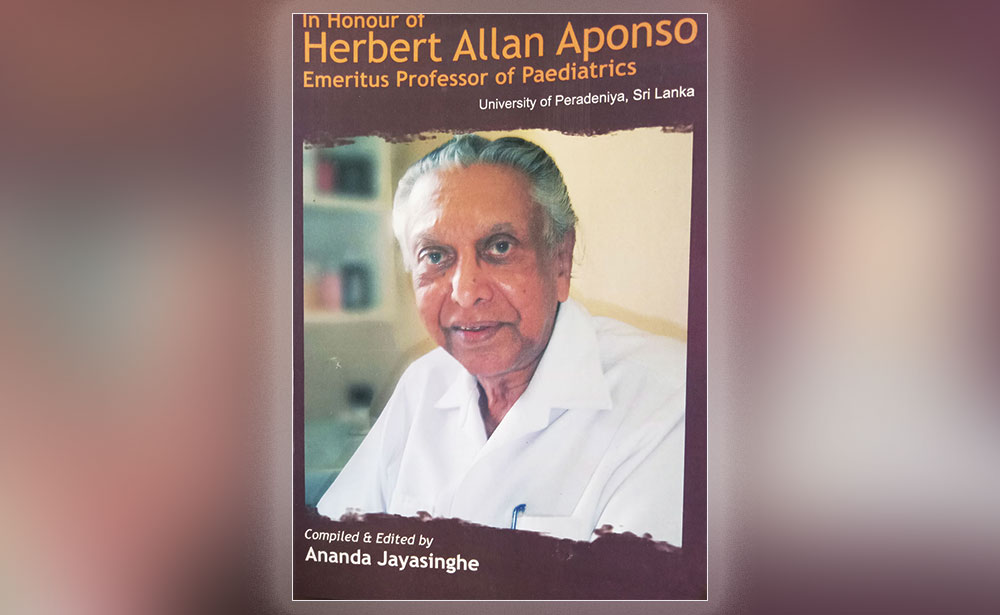
Herbert Allan Aponso, a true legend, the doyen of Paediatrics / Child Health, Professor Emeritus celebrated his 100th birthday on the 25th of March 2025, thus becoming a centenarian.
What a rare and glorious moment of anyone’s life!
I simply cannot recall any university academic achieving this exceptional milestone in Sri Lanka.
Born on the 25th of March 1925 in Lakshapathiya, Moratuwa, Professor Aponso has witnessed and thrived through a century of immense global change. It is fascinating to reflect on the world and Sri Lanka as they were in 1925. At that time, Sri Lanka (then Ceylon) was still a British colony, 23 years away from independence, with a population of just 4 million and an average life expectancy was below 40 years.
The world political map in 1925, was vastly different from that of today. One single large India without Pakistan and Bangladesh, one single Korea, no official Israel, and it was just three years after the fall of Ottoman Empire.
In the medical field, too, no United Nations, no WHO, no antibiotics, no blood banks, and no organised immunisation programmes. Diseases such as smallpox posed a dire threat to humanity, and devastating epidemics, such as the malaria outbreak in Ceylon in the early 1930s, resulted in negative population growth for the first time in history. Professor Aponso has survived through all these extreme challenging threats over the past one hundred years!
In 1964, he joined the Department of Paediatrics as a Senior Lecturer at Sri Lanka’s (then Ceylon) newly established second medical faculty, Peradeniya thus becoming a pioneer academic staff member of the Faculty of Medicine. He played a very vital role in teaching many a generation of doctors.
His brave decision to leave the position as Senior Lecturer at Faculty of Medicine, Colombo and relocate with his family to Peradeniya, is truly beyond belief as he left his birthplace and the more affluent Colombo life. At the time, the small town of Peradeniya was considered distinctly remote and less privileged.
He then became the quintessential ‘Peradeniya Man’, getting involved in the establishment of Kandy Society of Medicine (KSM), Peradeniya Medical school Alumni Association (PeMSAA) and in consolidating both the Department of Paediatrics and the Faculty of Medicine.
He retired from university service in 1993 after three decades of dedicated and remarkable service to the Faculty of Medicine and to the medical fraternity at large.
All staff members of Faculty of Medicine, Peradeniya and elsewhere who graduated before 1993 have invariably had exposure to his teaching, including myself and my wife Chandrika.
I also had the privilege of serving as Registrar in Paediatrics between 1985 and 1987 under his wing.
He is also blessed with three very caring children – Ajith, (Dr) Heshan and (Dr) Charmalie and many grandchildren and great grandchildren, all of whom care for him and look after him very well.
Professor Aponso is truly amazing and is perhaps the most complete man we can ever imagine, as he is a combination of numerous rare features moulded into one person. He has an attractive and gentle yet commanding personality, authority of a different kind, intelligence, kindness, passion, calm mind, commitment, high social standing and blessed with happy and exceptionally high-quality long life along with his gracious late wife (sadly passed away in 2017) Mrs Vimala Aponso and three caring children,
A devout Christian, Professor Aponso’s faith has been a guiding force throughout his life. At the same time, he has always recognised and respected the values of other faiths, particularly Buddhism. He often quoted the Buddhist scripture:
“Pûjâ ca pûjanîyânam” (Honour those who are worthy of honour) – Khp 5, Maṅgala Sutta.
This is well and truly appropriate and relevant to him.
He is a true legend of our time and above all a great human being.
I wish him a HAPPY 100TH BIRTHDAY!
Ananda Jayasinghe
(Retired Professor in Community Medicine, Faculty of Medicine, University of Peradeniya)
-

 News7 days ago
News7 days agoSeniors welcome three percent increase in deposit rates
-
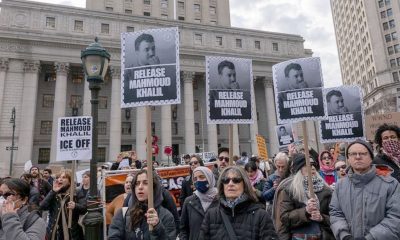
 Features7 days ago
Features7 days agoThe US, Israel, Palestine, and Mahmoud Khalil
-
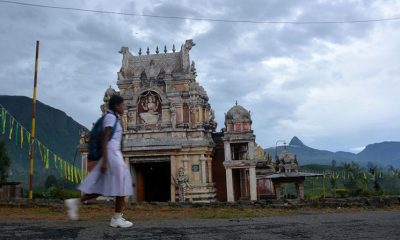
 News7 days ago
News7 days agoScholarships for children of estate workers now open
-
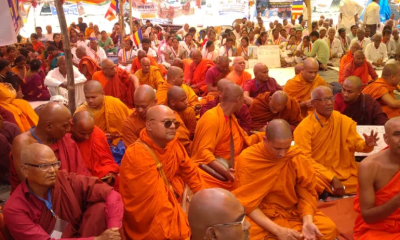
 Foreign News5 days ago
Foreign News5 days agoBuddhism’s holiest site erupts in protests over Hindu ‘control’ of shrine
-
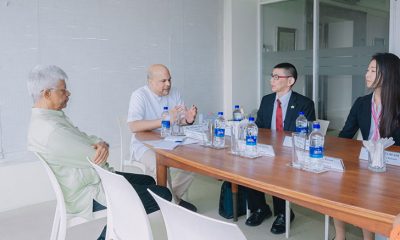
 News7 days ago
News7 days agoJapanese Defence Delegation visits Pathfinder
-

 Features4 days ago
Features4 days agoCelebrating 25 Years of Excellence: The Silver Jubilee of SLIIT – PART I
-

 Editorial6 days ago
Editorial6 days agoWhen tractors become cars!
-

 Business2 days ago
Business2 days agoAIA Higher Education Scholarships Programme celebrating 30-year journey











